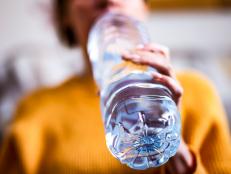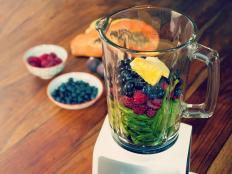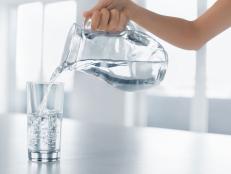What Does One Alcoholic Drink Actually Mean?
And how to calculate how many drinks you're having.

Adene Sanchez/Getty Images
The 2020-2025 dietary guidelines for Americans recommend no more than one drink per day for women and no more than two drinks per day for men. But what exactly counts as a drink? As it turns out there is more than one factor that determines how much alcohol one “drink” contains. Here's how to keep track of how many drinks you're having.
What Counts As One Drink?
According to the 2020-2025 dietary guidelines, one drink is defined as 12 ounces of beer, 5 ounces of wine and 1.5 ounces of 80-proof distilled spirits like rum or vodka. However, the volume of the alcohol is only half the equation.
Another critical aspect in determining one drink is knowing how much alcohol is in each beverage consumed. One standard “drink equivalent” contains 0.6 ounces of pure alcohol. This is also where alcohol by volume (ABV) comes into the picture. This means that each of the portions described before has a standard ABV.
- 12 ounces of beer (5% ABV)
- 5 ounces of wine (12% ABV)
- 1.5 ounces of 80-proof distilled spirits (40% ABV)
- 12 ounces of canned, ready-to-drink beverage (5% ABV) like a hard seltzer or other type of alcoholic beverage purchased in a can
When you go to the store and purchase alcohol, each bottle can vary on the percent ABV and oftentimes it can be higher than the percent ABV in a standard drink listed above. For example, if you are drinking a 16 ounce beer with 8% ABV, you’re drinking more than one drink equivalent. You can use a mathematical formula to figure this out. [(16 ounces X 0.08 ABV) ÷ 0.6oz ethanol] = 2.13 drink equivalents!
When you’re kicking back and enjoying an alcoholic beverage, probably the last thing you want to do is calculate your drink equivalents. That’s why in 2021 the Distilled Spirits Council of the United States (DISCUS) developed a drink calculator to “assist adult consumers in making responsible decisions regarding alcohol consumption,” explains Amanda Berger, Ph.D. vice president, science & health at DISCUS. All you need to enter is the volume of the drink (shown as mL or ounces) and the alcohol by volume (% ABV or proof).
What Are the Health Consequences of Alcohol?
The 2020-2025 dietary guidelines for Americans advises folks who do not drink not to start drinking alcohol. They also advise against drinking alcohol for any health benefits. In addition, some people shouldn’t drink at all, such as those who are pregnant or might be pregnant, those under the legal age for drinking, if you’re on certain medications that interact with alcohol, if you’re recovering from alcohol abuse or unable to control the amount you drink. According to the Centers for Disease Control (CDC), “It is the amount of alcohol consumed that affects a person most, not the type of alcoholic drink.” That is why Berger says, “Whether it is in distilled spirits, wine, or beer, the effects of ethanol (the pure alcohol that is in all beverage alcohol) on the body is the same. It is important for individuals to discuss their alcohol consumption with their healthcare providers, who can help determine what is best for that person based on individual risk factors, such as family history, genetics, and lifestyle.”
There are health consequences, especially when you drink too much alcohol. Heavy alcohol consumption is defined as having four or more drinks on any day or eight or more drinks per week for women and five or more drinks on any day or 15 or more drinks per week for men. Research has shown that drinking too much alcohol is associated with an elevated blood pressure. In addition, it can lead to other heart conditions such as cardiomyopathy is a disease of the heart (a muscle) that makes it harder for the heart to pump blood to the rest of the body and an increase risk for atrial fibrillation, the most common type of irregular heartbeat. In addition, the American Heart Association says that drinking too much alcohol can increase triglycerides (a type of fat in the blood). Having high triglycerides combined with high LDL (or “bad”) cholesterol and low HDL (or “good”) cholesterol can lead to fatty build-up in artery walls, which can ultimately increase the risk of a stroke or heart attack.
Does Alcohol Have Health Benefits?
Alcohol can be enjoyed as part of a balanced, healthy lifestyle and if you choose to drink, recommendations are outlined in the 2020-2025 dietary guidelines for Americans. However, according to Berger, “No one should be drinking alcohol to achieve a potential health benefit.”
Research has found that moderate consumption of alcohol may be associated with certain health benefits for some adults. These include a protective effect against cardiovascular disease including some types of strokes and diabetes. The American Heart Association says that if you do drink alcohol, do so in moderation. Drinking alcohol in moderation has also been linked to a reduced risk of certain forms of cancer. According to the National Cancer Institute (NCI), drinking alcohol has been associated with a decreased risk of kidney cancer and non-Hodgkin lymphoma in multiple studies. However, the NCI also states that “any potential benefits of alcohol consumption for reducing the risks of some cancers are likely outweighed by the harms of alcohol consumption."
Bottom Line: One type of alcohol is not healthier or better than another.
What is most important is the practice of moderation. To help you drink responsibly and to stay within the recommended alcohol amounts, if you choose to drink, use the drink calculator to help guide you.
Toby Amidor, MS, RD, CDN, is a registered dietitian and consultant who specializes in food safety and culinary nutrition. She is the author of The Greek Yogurt Kitchen: More Than 130 Delicious, Healthy Recipes for Every Meal of the Day.
*This article was written and/or reviewed by an independent registered dietitian nutritionist.
Related Links:

































